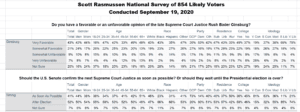In a survey conducted the day after her passing, 64% of Likely Voters said they had a favorable opinion of Ruth Bader Ginsburg. The Scott Rasmussen survey found just 16% with an unfavorable view while 20% are not sure.
These results are broadly consistent with earlier surveys in recent years. Justice Ginsburg was the most recognized name of all Supreme Court Justices, often the only name recognized by more than half the nation’s voters.
The survey also found that 52% of Likely Voters believe the Senate should wait to confirm Ginsburg’s replacement until after the presidential election. Forty-one percent (41%) disagree and believe the new Justice should be confirmed as soon as possible. Not surprisingly, there is a substantial partisan divide on this question.
- Seventy-three percent (73%) of Republicans believe the new Justice should be confirmed as soon as possible.
- Eighty percent (80%) of Democrats believe confirmation should wait until after the election.
- Independent voters were more evenly divided. Fifty-one percent (51%) agree with the Democrats and 40% with the Republicans.
Additionally, 59% of the nation’s Likely Voters believe Joe Biden should let voters know who he would nominate if elected. Just 21% disagree while 20% are not sure.
The partisan divide on this is interesting. The Trump campaign has been pushing Biden to release a list of potential nominees. However, Democratic voters are even more likely than Republican voters to think he should do so. Sixty-six percent (66%) of Democrats want their party’s nominee to announce who he would nominate for the Court. That view is shared by 57% of Independent voters and 52% of Republicans.
Other data from the survey shows that 53% of voters rate the Supreme Court’s performance as good or excellent.
Results for the full sample have a Margin of Error of +/- 3.4 percentage points.
LISTEN TO Scott’s Podcast.
SIGN UP to receive Scott’s free email newsletter.
CHECK OUT Scott’s latest polls.
Methodology
The survey of 854 Likely Voters was conducted online by Scott Rasmussen September 19, 2020. Field work for the survey was conducted by RMG Research, Inc. These voters were selected from a larger sample of 1,100 Registered Voters. Likely Voters were defined as those who say they are “Definitely going to vote” or “Very Likely to Vote” and who know how they will vote. Certain quotas were applied to the overall sample and lightly weighted by geography, gender, age, race, education, and political party to reasonably reflect the nation’s population of Registered Voters. Other variables were reviewed to ensure that the final sample is representative of that population.




